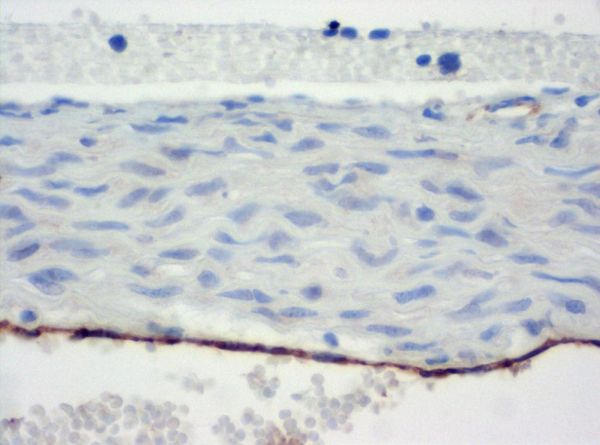
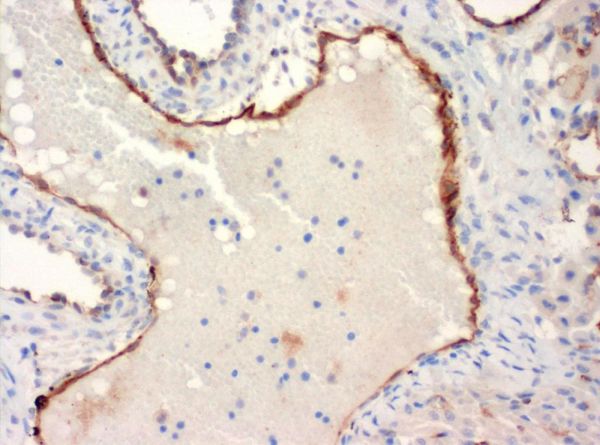
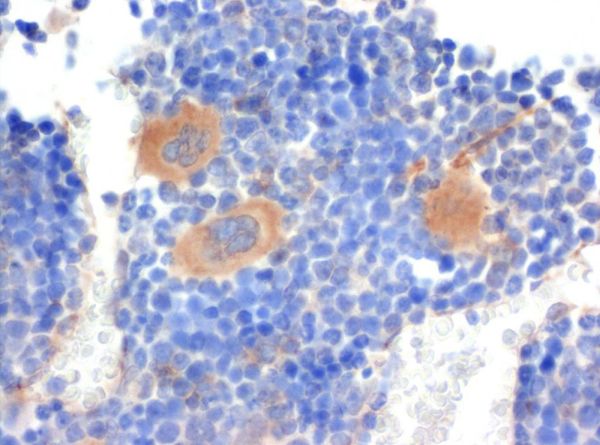
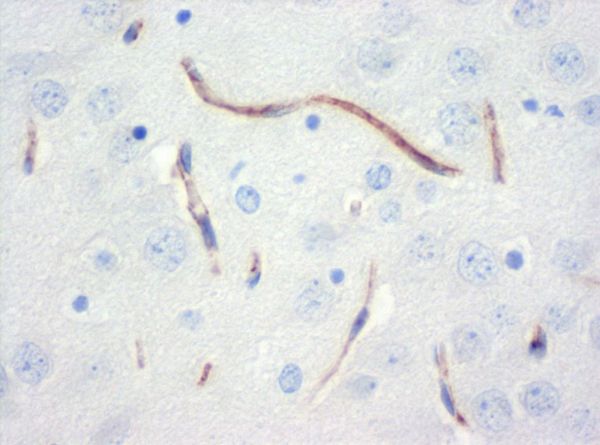
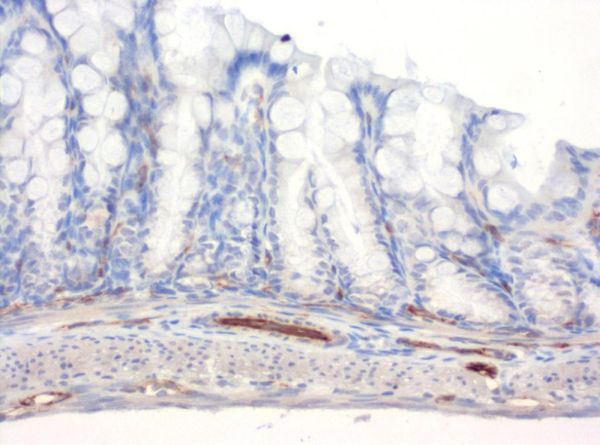
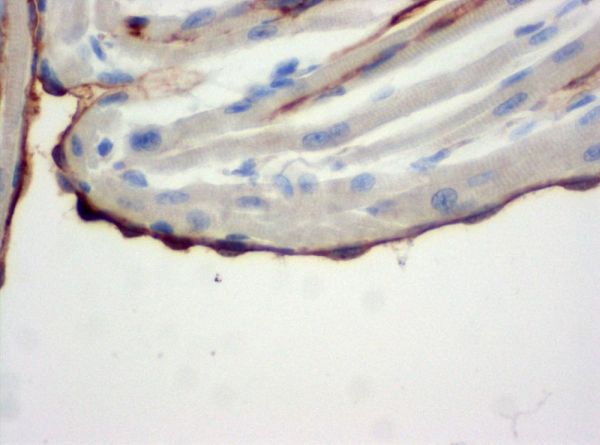
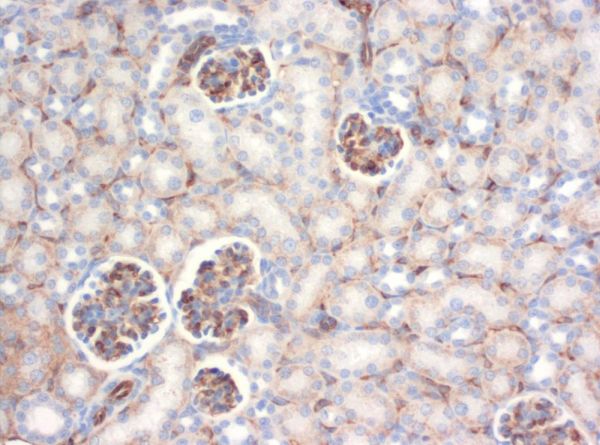
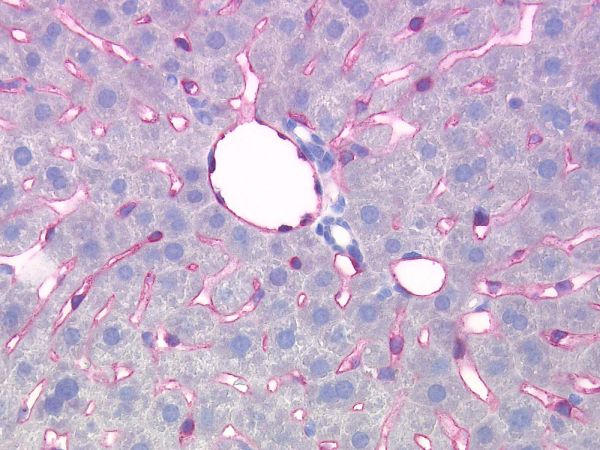
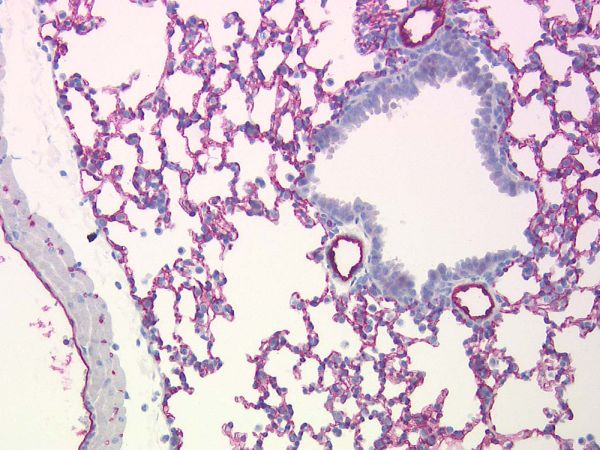
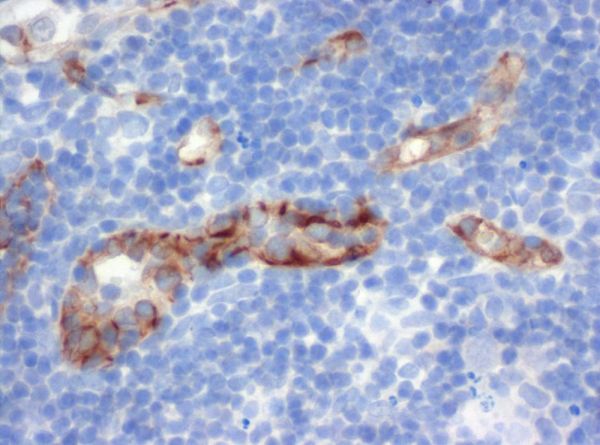
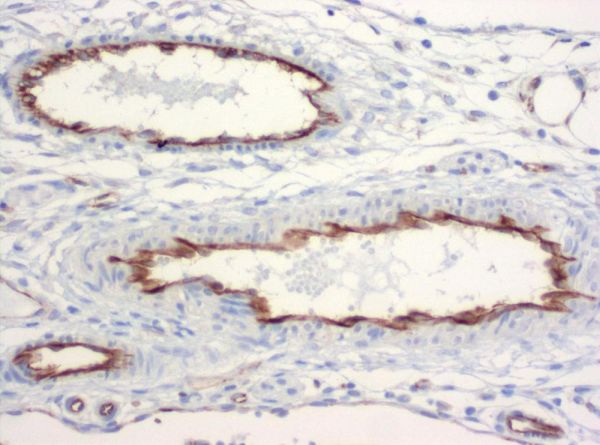
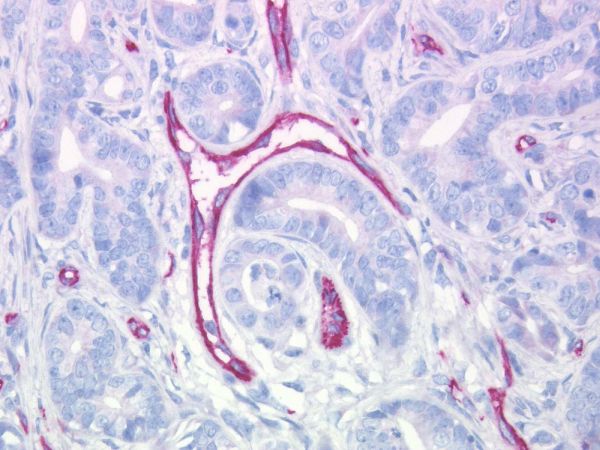
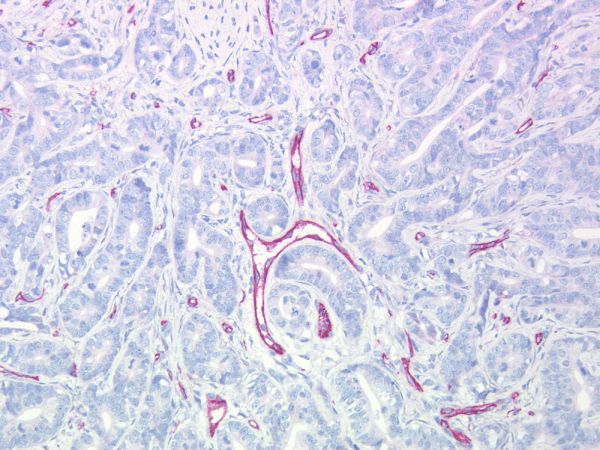
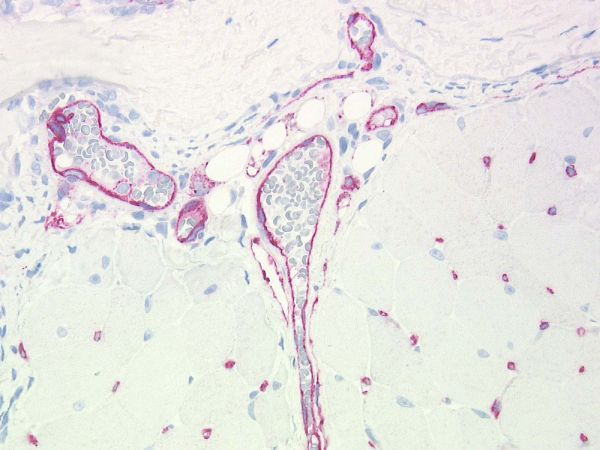
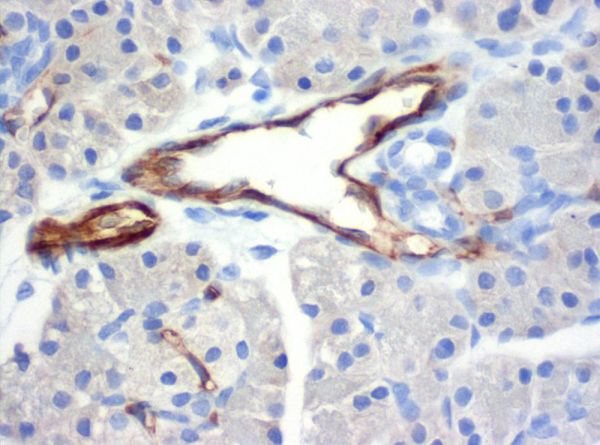
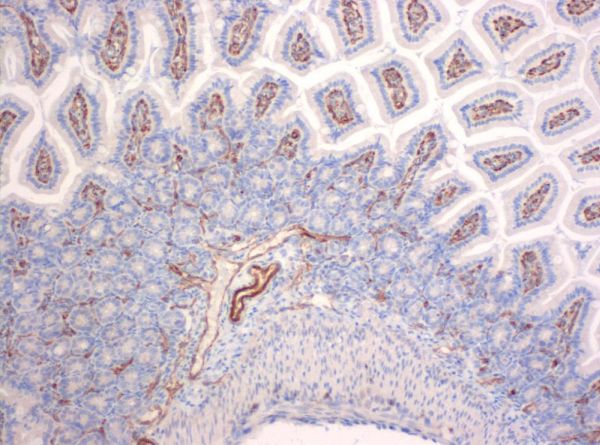
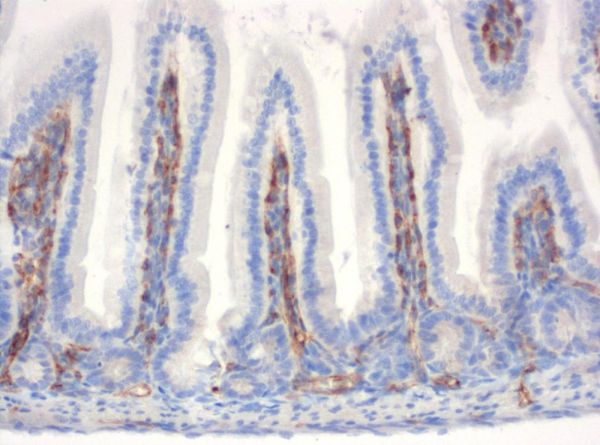
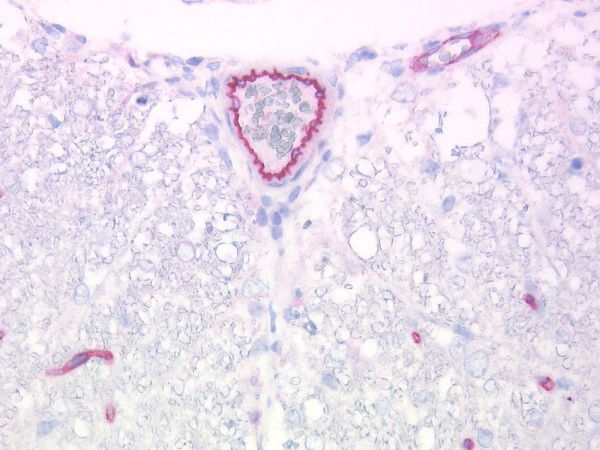
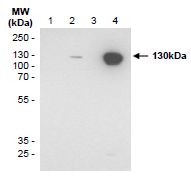
-
SKU DIA-310 Specificity CD31 (PECAM-1)
Species Reactivity Mouse, Swine
Immunogen Murine amino acid fragment (amino acids 610-681 of mouse CD31)
Host Species Rat
Isotype IgG2a
Clone SZ31
Clonality (Mono-/Polyclonal) monoclonal
Application Immunocytochemistry, Immunofluorescence, Immunohistochemistry (frozen sections), Immunohistochemistry (IHC), Immunohistochemistry (Paraffin-embedded Sections), Western Blot
Conjugation unconjugated
Dilution Immunohistochemistry (IHC): 1:20, Western Blot (WB): 1:5,000
Format 0.05% NaN3, 2% BSA, in PBS (pH 7.4), lyophilisate, purified antibody (from culture supernatant)
Application Note No Crossreactivity with human CD31
Product line / Topic Angiogenesis, CD Markers
Intended Use for Research Use Only
Temperature - Storage 2-8°C
Temperature - Transport at room temperature
Search Code DIA310
Manufacturer / Brand dianova
Uniprot_ID Q08481
Gene_ID 18613
Alias CD31, EndoCAM, GPIIA', PECA1, Pecam, Pecam-1, Pecam1, Platelet endothelial cell adhesion molecule, Platelet/Endothelial Cell Adhesion Molecule, Platelet/Endothelial Cell Adhesion Molecule 1
-
Reactivity:
Antibody clone SZ31 is the first antibody which reacts specifically with murine CD31 in formalin-fixed paraffin-embedded tissue sections. Clone SZ31 shows no cross-reactivity to human CD31.
Outstanding specificity of clone SZ31 has been confirmed in more than 185 citations (CiteAB).
Background:
CD31, also known as PECAM-1 (Platelet Endothelial Cell Adhesion Molecule-1) is expressed constitutively on the surface of embryonic and adult endothelial cells. It is also expressed on cell surfaces of monocytes, neutrophils, platelets and certain T-cell subsets. It has been detected on bone marrow-derived hematopoetic stem cells and embryonic stem cells. Cluster of Differentiation 31 (CD31) is a 130kDa integral membrane glycoprotein and as a member of the immunoglobulin superfamily involved in the mediation of cell-to-cell adhesion. CD31-mediated endothelial cell-cell interactions play a major role in angiogenesis. Studies have shown CD31 to be a superior marker in human angiogenesis, which reportedly predicts tumor recurrence. Pathophysiological studies of CD31 in murine model systems had limitations because standard formalin-fixed sections were excluded. The clone SZ31 (Anti-CD31) eliminates these restrictions by allowing high quality immunohistochemical analysis of standard formalin-fixed paraffin sections in mice.
Immunohistochemistry of mouse CD31 (PECAM-1) in formalin-fixed paraffin-embedded tissue sections
The monoclonal antibody clone SZ31 reacts specifically with endothelial cells in vessels and capillaries of:
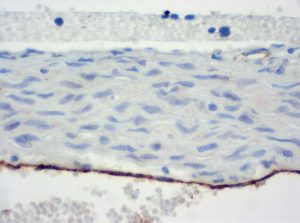
aorta
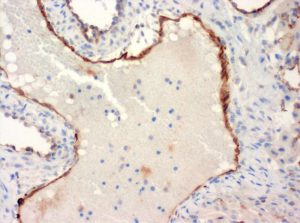
aortic origin
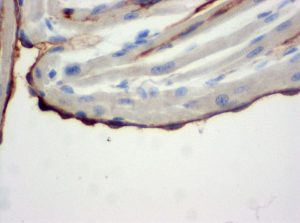
endocardium
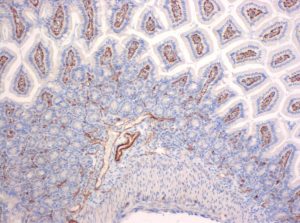
small intestine
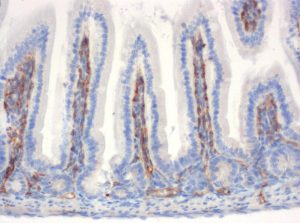
small intestine
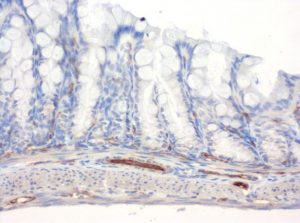
colon
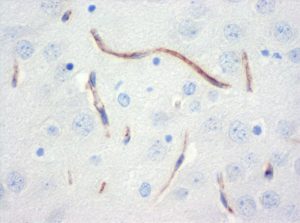
brain
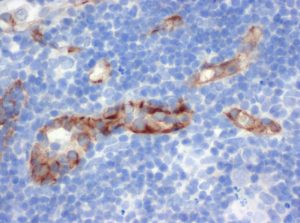
lymph nodes
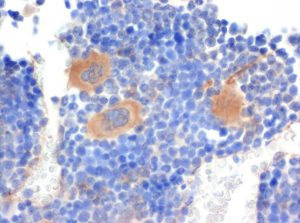
bone marrow
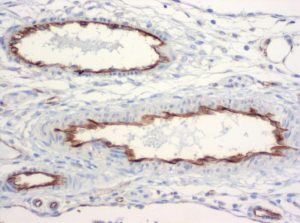
mesenterial vessels
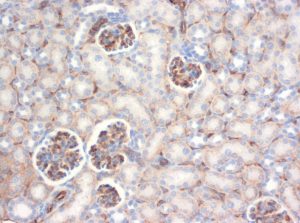
kidney
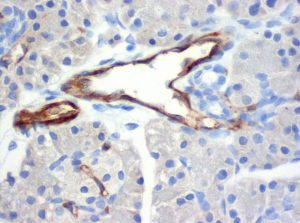
pancreas
(pictures courtesy of Prof. Dr. Robert Klopfleisch, Institute of Pathology, Department of Veterinary Pathology, Berlin, Germany)
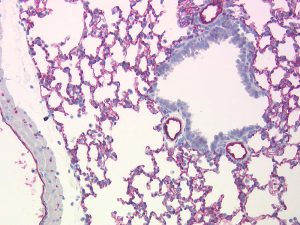
Lung
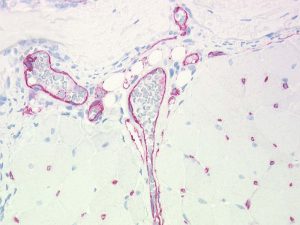
Muscle
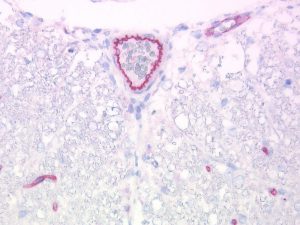
Spinal
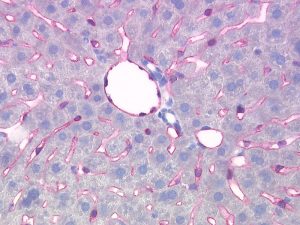
Liver
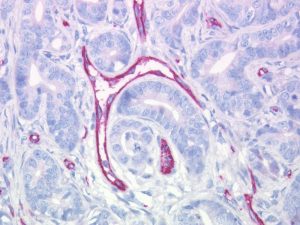
Adenocarcinoma
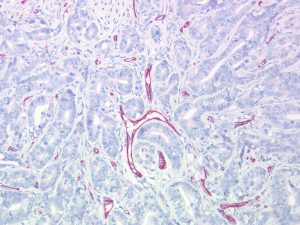
Adenocarcinoma
(pictures courtesy of Prof. Dr. H. Stein, Institute of Pathology, Charité Campus Benjamin Franklin, Berlin, Germany)
Western Blot analysis
Immunoblot of extracts from murine lung, J558L cells and m-Lend cells using CD31 rat monoclonal antibody clone SZ31 (DIA-310 1:5.000) and goat anti-rat-HRP antibody (1:10.000).
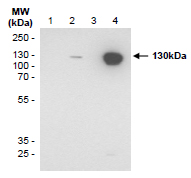
Lane:
- J558 cells (CD31-), 25μg lysate
- murine lung, 25μg lysate
- blank
- m-Lend cells (CD31+), 12.5μg lysate
Specific References:
- Kim K, Watson PA, Lebdai S, Jebiwott S, Somma A, La Rosa SP, Mehta D, Murray KS, Lilja HG, Ulmert D, Monette S, Scherz AJ, Coleman J. Androgen Deprivation Therapy Potentiates the Efficacy of Vascular Targeted Photodynamic Therapy of Prostate Cancer Xenografts. Clin Cancer Res. 2018 Feb 20; PMID: 29463549
- de Jong RJ, Paulin N, Lemnitzer P, Viola JR, Winter C, Ferraro B, Grommes J, Weber C, Reutelingsperger C, Drechsler M, Soehnlein O. Protective Aptitude of Annexin A1 in Arterial Neointima Formation in Atherosclerosis-Prone Mice-Brief Report. Arterioscler Thromb Vasc Biol. 2017 Feb;37(2):312–315. PMID: 28062503
- Looney AP, Han R, Stawski L, Marden G, Iwamoto M, Trojanowska M. Synergistic Role of Endothelial ERG and FLI1 in Mediating Pulmonary Vascular Homeostasis. Am J Respir Cell Mol Biol. 2017;57(1):121–131. PMCID: PMC5516275
- Matsuki M, Adachi Y, Ozawa Y, Kimura T, Hoshi T, Okamoto K, Tohyama O, Mitsuhashi K, Yamaguchi A, Matsui J, Funahashi Y. Targeting of tumor growth and angiogenesis underlies the enhanced antitumor activity of lenvatinib in combination with everolimus. Cancer Sci. 2017 Apr;108(4):763–771. PMCID: PMC5406533
- Yanagida K, Liu CH, Faraco G, Galvani S, Smith HK, Burg N, Anrather J, Sanchez T, Iadecola C, Hla T. Size-selective opening of the blood–brain barrier by targeting endothelial sphingosine 1–phosphate receptor 1. PNAS. 2017 Apr 25;114(17):4531–4536. PMID: 28396408
- Zaccagnino A, Managò A, Leanza L, Gontarewitz A, Linder B, Azzolini M, Biasutto L, Zoratti M, Peruzzo R, Legler K, Trauzold A, Kalthoff H, Szabo I. Tumor-reducing effect of the clinically used drug clofazimine in a SCID mouse model of pancreatic ductal adenocarcinoma. Oncotarget. 2017 Jun 13;8(24):38276–38293. PMCID: PMC5503532
- Stout-Delgado HW, Cho SJ, Chu SG, Mitzel DN, Villalba J, El-Chemaly S, Ryter SW, Choi AMK, Rosas IO. Age-Dependent Susceptibility to Pulmonary Fibrosis Is Associated with NLRP3 Inflammasome Activation. Am J Respir Cell Mol Biol. 2016;55(2):252–263. PMCID: PMC4979364
- Rovithi M, de Haas RR, Honeywell RJ, Poel D, Peters GJ, Griffioen AW, Verheul HMW. Alternative scheduling of pulsatile, high dose sunitinib efficiently suppresses tumor growth. J Exp Clin Cancer Res. 2016 Sep 7;35(1):138. PMCID: PMC5013589
- Rossi E, Gerges I, Tocchio A, Tamplenizza M, Aprile P, Recordati C, Martello F, Martin I, Milani P, Lenardi C. Biologically and mechanically driven design of an RGD-mimetic macroporous foam for adipose tissue engineering applications. Biomaterials. 2016;104:65–77. PMID: 27428768
- Shami A, Knutsson A, Dunér P, Rauch U, Bengtsson E, Tengryd C, Murugesan V, Durbeej M, Gonçalves I, Nilsson J, Hultgårdh-Nilsson A. Dystrophin deficiency reduces atherosclerotic plaque development in ApoE-null mice. Sci Rep. 2015 Sep 8;5:13904. PMCID: PMC4561962
- Goumas FA, Holmer R, Egberts J-H, Gontarewicz A, Heneweer C, Geisen U, Hauser C, Mende M-M, Legler K, Röcken C, Becker T, Waetzig GH, Rose-John S, Kalthoff H. Inhibition of IL-6 signaling significantly reduces primary tumor growth and recurrencies in orthotopic xenograft models of pancreatic cancer. Int J Cancer. 2015 Sep 1;137(5):1035–1046. PMID: 25604508
- Yue GG-L, Lee JK-M, Kwok H-F, Cheng L, Wong EC-W, Jiang L, Yu H, Leung H-W, Wong Y-L, Leung P-C, Fung K-P, Lau CB-S. Novel PI3K/AKT targeting anti-angiogenic activities of 4-vinylphenol, a new therapeutic potential of a well-known styrene metabolite. Sci Rep. 2015 Jun 8;5:11149. PMCID: PMC4459151
- Nowak-Sliwinska P, Weiss A, van Beijnum JR, Wong TJ, Kilarski WW, Szewczyk G, Verheul HMW, Sarna T, van den Bergh H, Griffioen AW. Photoactivation of lysosomally sequestered sunitinib after angiostatic treatment causes vascular occlusion and enhances tumor growth inhibition. Cell Death Dis. 2015 Feb 12;6:e1641. PMCID: PMC4669819
- Erben U, Loddenkemper C, Doerfel K, Spieckermann S, Haller D, Heimesaat MM, Zeitz M, Siegmund B, Kühl AA. A guide to histomorphological evaluation of intestinal inflammation in mouse models. Int J Clin Exp Pathol. 2014;7(8):4557–4576. PMCID: PMC4152019
- El-Gazzar A, Cai X, Reeves RS, Dai Z, Caballero-Benitez A, McDonald DL, Vazquez J, Gooley TA, Sale GE, Spies T, Groh V. Effects on tumor development and metastatic dissemination by the NKG2D lymphocyte receptor expressed on cancer cells. Oncogene. 2014 Oct 9;33(41):4932–4940. PMCID: PMC3994187
- Kono M, Tucker AE, Tran J, Bergner JB, Turner EM, Proia RL. Sphingosine-1-phosphate receptor 1 reporter mice reveal receptor activation sites in vivo. J Clin Invest. 2014 May;124(5):2076–2086. PMCID: PMC4001537
- Sun X, He S, Wara AKM, Icli B, Shvartz E, Tesmenitsky Y, Belkin N, Li D, Blackwell TS, Sukhova GK, Croce K, Feinberg MW. Systemic delivery of microRNA-181b inhibits nuclear factor-κB activation, vascular inflammation, and atherosclerosis in apolipoprotein E-deficient mice. Circ Res. 2014 Jan 3;114(1):32–40. PMCID: PMC4051320
- Becker MO, Kill A, Kutsche M, Guenther J, Rose A, Tabeling C, Witzenrath M, Kühl AA, Heidecke H, Ghofrani HA, Tiede H, Schermuly RT, Nickel N, Hoeper MM, Lukitsch I, Gollasch M, Kuebler WM, Bock S, Burmester GR, Dragun D, Riemekasten G. Vascular receptor autoantibodies in pulmonary arterial hypertension associated with systemic sclerosis. Am J Respir Crit Care Med. 2014 Oct 1;190(7):808–817. PMID: 25181620
- Copeland BT, Bowman MJ, Ashman LK. Genetic ablation of the tetraspanin CD151 reduces spontaneous metastatic spread of prostate cancer in the TRAMP model. Mol Cancer Res. 2013 Jan;11(1):95–105. PMID: 23131993
- Yabuuchi S, Pai SG, Campbell NR, de Wilde RF, De Oliveira E, Korangath P, Streppel MM, Rasheed ZA, Hidalgo M, Maitra A, Rajeshkumar NV. Notch signaling pathway targeted therapy suppresses tumor progression and metastatic spread in pancreatic cancer. Cancer Lett. 2013 Jul 10;335(1):41–51. PMCID: PMC3665739
- Ferretti E, Montagna D, Di Carlo E, Cocco C, Ribatti D, Ognio E, Sorrentino C, Lisini D, Bertaina A, Locatelli F, Pistoia V, Airoldi I. Absence of IL-12Rβ2 in CD33(+)CD38(+) pediatric acute myeloid leukemia cells favours progression in NOD/SCID/IL2RγC-deficient mice. Leukemia. 2012 Feb;26(2):225–235. PMID: 21844875
- Pichery M, Mirey E, Mercier P, Lefrancais E, Dujardin A, Ortega N, Girard J-P. Endogenous IL-33 is highly expressed in mouse epithelial barrier tissues, lymphoid organs, brain, embryos, and inflamed tissues: in situ analysis using a novel Il-33-LacZ gene trap reporter strain. J Immunol. 2012 Apr 1;188(7):3488–3495. PMID: 22371395
- Jiang J, Thyagarajan-Sahu A, Krchňák V, Jedinak A, Sandusky GE, Sliva D. NAHA, a novel hydroxamic acid-derivative, inhibits growth and angiogenesis of breast cancer in vitro and in vivo. PLoS ONE. 2012;7(3):e34283. PMCID: PMC3315582
- Nishimura R, Wakabayashi M, Hata K, Matsubara T, Honma S, Wakisaka S, Kiyonari H, Shioi G, Yamaguchi A, Tsumaki N, Akiyama H, Yoneda T. Osterix regulates calcification and degradation of chondrogenic matrices through matrix metalloproteinase 13 (MMP13) expression in association with transcription factor Runx2 during endochondral ossification. J Biol Chem. 2012 Sep 28;287(40):33179–33190. PMCID: PMC3460424
- Kramer-Marek G, Gijsen M, Kiesewetter DO, Bennett R, Roxanis I, Zielinski R, Kong A, Capala J. Potential of PET to predict the response to trastuzumab treatment in an ErbB2-positive human xenograft tumor model. J Nucl Med. 2012 Apr;53(4):629–637. PMID: 22410461
- Martin-Padura I, Marighetti P, Agliano A, Colombo F, Larzabal L, Redrado M, Bleau A-M, Prior C, Bertolini F, Calvo A. Residual dormant cancer stem-cell foci are responsible for tumor relapse after antiangiogenic metronomic therapy in hepatocellular carcinoma xenografts. Lab Invest. 2012 Jul;92(7):952–966. PMID: 22546866
- Hölscher M, Silter M, Krull S, von Ahlen M, Hesse A, Schwartz P, Wielockx B, Breier G, Katschinski DM, Zieseniss A. Cardiomyocyte-specific prolyl-4-hydroxylase domain 2 knock out protects from acute myocardial ischemic injury. J Biol Chem. 2011 Apr 1;286(13):11185–11194. PMCID: PMC3064173
- Kröger C, Vijayaraj P, Reuter U, Windoffer R, Simmons D, Heukamp L, Leube R, Magin TM. Placental vasculogenesis is regulated by keratin-mediated hyperoxia in murine decidual tissues. Am J Pathol. 2011 Apr;178(4):1578–1590. PMCID: PMC3078447
- Agliano A, Martin-Padura I, Marighetti P, Gregato G, Calleri A, Prior C, Redrado M, Calvo A, Bertolini F. Therapeutic effect of lenalidomide in a novel xenograft mouse model of human blastic NK cell lymphoma/blastic plasmacytoid dendritic cell neoplasm. Clin Cancer Res. 2011 Oct 1;17(19):6163–6173. PMID: 21856771
- Anania MC, Sensi M, Radaelli E, Miranda C, Vizioli MG, Pagliardini S, Favini E, Cleris L, Supino R, Formelli F, Borrello MG, Pierotti MA, Greco A. TIMP3 regulates migration, invasion and in vivo tumorigenicity of thyroid tumor cells. Oncogene. 2011 Jul 7;30(27):3011–3023. PMID: 21339735
- Gramann M, Wendler O, Haeberle L, Schick B. Prominent collagen type VI expression in juvenile angiofibromas. Histochem Cell Biol. 2009 Jan;131(1):155–164. PMID: 18797915
-

Aorta 
Aortic-origin 
Bone-Marrow 
Brain 
Colon 
Endocardium 
Kidney 
Liver 
Lung 
Lymph-nodes 
Mesenteric vessels 
Murine adenocarcinoma 
Murine adenocarcinoma 2 
Skeletal muscle 
Pancreas 
Small intestine 
Small intestine 2 
Spinal Cord 
Western-Blot




 MSDS_dianova_V09
MSDS_dianova_V09